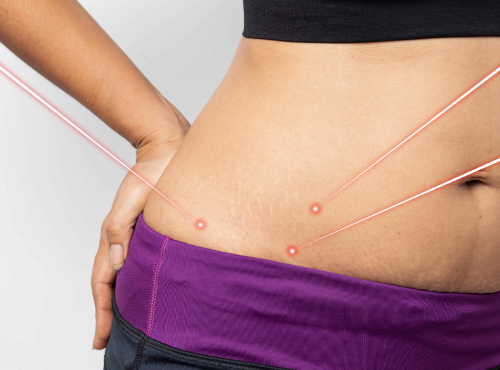Related searches

What is Laser Fat Removal
Unlike liposuction, which involves surgery and the removal of fat through a cannula, laser fat removal works by liquefying fat cells, which are then naturally eliminated by the body’s lymphatic system. The laser energy penetrates the skin, heats up the fat cells beneath the surface, and triggers a process known as apoptosis (cell death), leaving the surrounding tissue unharmed.
How Does Laser Fat Removal Work?
Laser Application: A handheld device is applied to the skin, delivering controlled laser energy to the targeted area. The laser selectively targets fat cells beneath the skin’s surface.
Fat Cell Disruption: The laser energy disrupts the structure of the fat cells, breaking them down into a liquid form that is easier for the body to expel over time.
Natural Elimination: Over the course of a few weeks to months, the body’s natural metabolic processes gradually flush out the broken-down fat cells, leading to a noticeable reduction in fat in the treated area.
Minimal Downtime: One of the key benefits of laser fat removal is that it requires little to no downtime. Patients can resume their daily activities immediately after treatment.
Benefits of Laser Fat Removal
Non-Invasive: No needles, cuts, or anesthesia are required. It is a non-surgical procedure, making it a safer option compared to traditional liposuction.
Targeted Fat Reduction: Laser fat removal can target specific problem areas like the abdomen, love handles, thighs, arms, and chin. It’s perfect for those who have stubborn fat that doesn’t respond to diet and exercise.
Minimal Discomfort: Many patients report feeling only mild warmth or a slight tingling sensation during the treatment. Some may experience temporary redness or swelling after the procedure, but these side effects usually subside quickly.
No Downtime: One of the major advantages of laser fat removal is that there’s minimal downtime involved. You can typically go back to work and resume normal activities immediately after treatment.
Long-Term Results: Once fat cells are eliminated, they do not regenerate, meaning the results of laser fat removal can be long-lasting as long as you maintain a healthy lifestyle.
Who is a Good Candidate for Laser Fat Removal?
Laser fat removal is ideal for individuals who are at or near their ideal weight but struggle with localized fat that is resistant to diet and exercise. Common target areas include:
Abdomen
Love handles
Inner and outer thighs
Arms
Back
Chin (double chin)
It’s important to note that laser fat removal is not a weight-loss solution and should not be considered a substitute for regular exercise or healthy eating habits. The treatment works best for people who have localized fat pockets and are already leading a healthy lifestyle.
What to Expect During and After Treatment
During the Procedure: Laser fat removal is typically a quick procedure. Depending on the size of the treatment area, it may take anywhere from 25 minutes to an hour. You’ll be comfortable throughout, as no anesthesia is required.
Post-Treatment: After the procedure, you may experience some temporary redness, swelling, or tenderness in the treated area. These side effects usually resolve within a few days. The full results can take a few weeks to become noticeable, as it takes time for the body to eliminate the fat cells.
Results: Most patients begin to see results within 4 to 6 weeks, with the final results visible after about 3 months. The treated area will appear slimmer and more contoured, with a more toned appearance.
Considerations and Risks
While laser fat removal is generally considered safe, it’s important to consult with a qualified provider to determine if the treatment is right for you. Potential risks and considerations include:
Temporary Side Effects: Redness, swelling, and discomfort are common but usually resolve on their own.
Multiple Sessions: In some cases, more than one session may be needed to achieve the desired results, particularly for larger or more stubborn fat deposits.
Not a Weight Loss Solution: This treatment is not intended to replace a healthy diet or exercise routine. It’s best for those looking to eliminate small, stubborn fat areas.
Cost: Laser fat removal treatments can be costly, with prices varying based on the area treated and the number of sessions required. Insurance typically does not cover these treatments since they are considered cosmetic.
Conclusion
Laser fat removal is an innovative, non-invasive way to eliminate stubborn fat without the need for surgery. It offers a safe and effective solution for individuals looking to contour specific areas of the body with minimal downtime and discomfort. However, it’s essential to maintain a healthy lifestyle to achieve and maintain long-lasting results. If you're interested in laser fat removal, consult with a licensed provider to discuss your goals and determine whether it's the right option for you.








